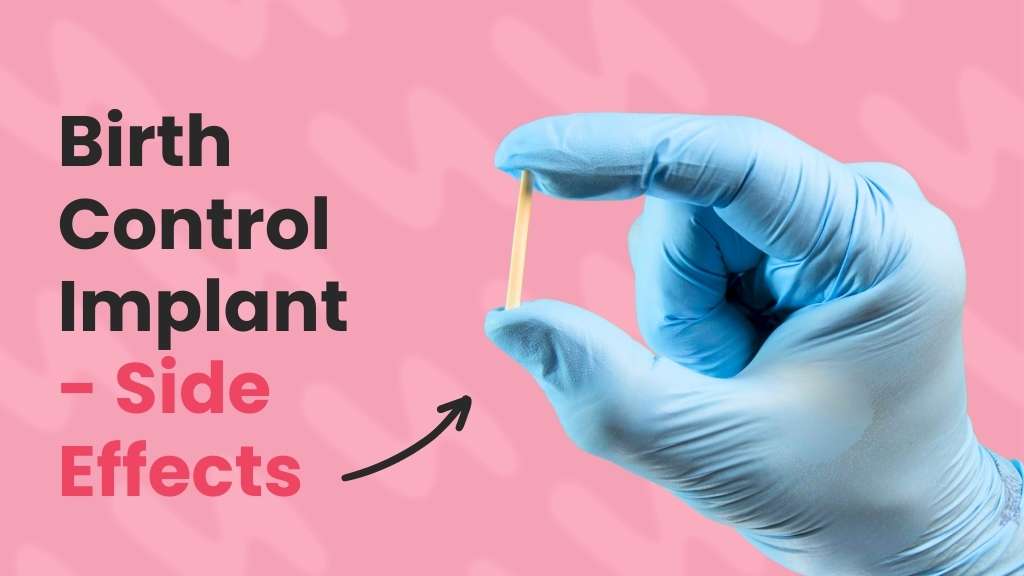
Table of Contents
The birth control implant, which was once called Implanon, is now known as Nexplanon. It’s a reliable way to prevent pregnancy – more than 99 out of 100 people who use it don’t get pregnant each year. Before we get into the nitty gritty of birth control implant side effects, let’s first go through what this miracle device is and how it is inserted and removed. Further on we’ll be discussing if birth control takes an effect on pregnancies and breastmilk.
What is a Birth Control Implant?
Birth control implants are small devices that are placed under a woman’s skin. They have a special hormone to stop you from getting pregnant. The birth control implant available in the US is called Nexplanon. It’s like a newer kind of implant modified from Implanon. Some folks might call them arm bars. The implant is a little plastic stick about the size of a tiny matchstick. And no, the negative effects of plastics are not one of the birth control implant side effects.
How Does a Birth Control Implant Work?
The implant functions by releasing progestin hormone into your system. This hormone stops pregnancy by inhibiting the release of eggs from your ovaries (ovulation). If there’s no egg available to combine with sperm, pregnancy is unlikely. Moreover, progestin also makes your cervical mucus thicker, preventing sperm passage. Hormonal implants are over 99% effective. How do they compare to other methods of birth control?
- Birth control injections are 94% effective.
- Intrauterine devices (IUDs) are also 99% successful.
- The mini-pill is 91% effective.
But here’s a word of caution: none of these contraceptives is meant to protect you from STDs. Only condoms do that job.
How is a Birth Control Implant Put In?
Your healthcare professional will place the birth control implant in their clinic, following these steps:
- You’ll lie on an exam table with your arm bent at the elbow like the shape of the letter “L.”
- They will apply local anesthesia to numb the skin on your inner upper arm, so you won’t feel pain.
- Normally, it is inserted in your non-dominant arm, but your provider will ask about your preference.
- They will insert the implant under your skin using a specialized needle-like tool.
- Stitches are not required, though your provider might put a bandage on it to help with bruising.
The entire procedure is completed in just a few minutes. But, how long does a birth control implant work? You can use it for up to 3 years before replacing it with a new one. Needless to say, the birth control implant side effects will only get more serious if you try to insert it yourself.
What are The Benefits of a Birth Control Implant?
The benefits surpass any of the birth control implant side effects, making it a popular choice of contraception. Here’s why:
- The implant is currently authorized for three years, yet it remains effective for a span of up to five years.
- There’s no need for daily or weekly replacements.
- It doesn’t bother the natural moments of intimacy.
- Being discreet, it remains unseen by others.
- It’s suitable for individuals who can’t use birth control with estrogen.
- Usable during breastfeeding.
- Potential to decrease excessive menstrual bleeding.
- Fertility returns promptly after implant removal.
How is a Birth Control Implant Removed?
A medical professional needs to take out your birth control implant. While the implant is approved for three years, research shows it can work for up to five years. You can choose when to have it removed with your healthcare provider’s guidance.
To remove the implant, your provider will numb your arm and make a small cut to take it out using forceps or tweezers. No stitches are needed, just a bandage. The process is quick and takes a few minutes. Don’t try to remove it yourself – only trained providers should insert or remove implants. Once it’s out, you won’t be protected from pregnancy, so use another birth control method if you want to avoid getting pregnant.
Birth Control and Pregnancy?
For most implant users, periods tend to become lighter and less frequent. Some might worry about pregnancy if periods change, but this is a typical effect of the implant and doesn’t necessarily indicate pregnancy. The implant offers a high level of pregnancy protection.
Once your healthcare provider removes the implant, pregnancy becomes possible quite quickly. Ovulation might happen shortly after removal, potentially within a few days. If you had sex in the week leading up to removal, there could still be viable sperm in your body, which could fertilize an egg if ovulation occurs.
After ovulation, it usually takes around 14 days for a pregnancy test to show if you’re pregnant. If you’ve removed your implant, you might want to take a pregnancy test during this period to make sure you’re not pregnant. To avoid pregnancy, think about using a different type of birth control as soon as you remove the implant.
Birth Control and Breastfeeding?
Progestin-only oral contraceptives, often referred to as “The Mini-Pill,” contain only progestin, a hormone found in females. When taken daily, this method works well for breastfeeding women. While it’s slightly less effective than combined oral contraceptives (which contain both estrogen and progestin), it’s important to note that breastfeeding can naturally reduce fertility.
Studies suggest that the small amount of hormone transferred to breast milk doesn’t harm the baby and might even have positive effects on milk quantity and quality. Some healthcare providers recommend switching to combination OCs after breastfeeding or when periods resume for slightly better effectiveness.
Birth Control Pill
“The Pill,” or a combination of oral contraceptives, includes both estrogen and progestin. Studies show that low-dose OCs are not a good choice while breastfeeding mothers once milk production is established. Alternative options without estrogen are usually preferred during breastfeeding, such as the Mini-Pill, IUDs, and progestin-only arm implants. This keeps the parent from experiencing adverse birth control implant side effects while breastfeeding.
Mirena IUD
The Mirena IUD, which releases a minimal amount of hormone locally in the uterus, doesn’t impact breast milk quality or quantity. It’s a safe and effective option for five years.
Depo Provera
Medroxyprogesterone (Depo Provera), an injectable method, is safe for breastfeeding and doesn’t hinder milk production. Some research suggests it might even enhance breast milk quality by improving fat content, calories, minerals, and protein composition.
Nexplanon
Nexplanon, a progestin-only implant, is inserted into the upper arm through a simple office procedure. Highly effective for three years, it can even be inserted shortly after giving birth.
An Endnote
Using birth control pills in the early stages of pregnancy doesn’t seem to raise the chance of birth defects. Some studies have hinted that taking these pills around conception could potentially lead to a higher chance of birth control implant side effects in newborns, like low birth weight or being born too early. However, these problems aren’t commonly observed by healthcare experts.
Birth control pills help prevent pregnancy and can also decrease the likelihood of a fertilized egg attaching outside the womb, which is known as ectopic pregnancy. If you happen to become pregnant while on a progestin-only birth control pill (often called the mini pill), there’s a slightly increased chance of the pregnancy being ectopic.
As a precaution, it is important to consider all the birth control implant pros and cons. If you think you might be pregnant, try a home pregnancy test. If it shows positive, stop taking the pill. If you can’t do a home test, halt the birth control pills until you can consult a healthcare provider to confirm pregnancy. During this time, use another form of birth control, like condoms. If you’re concerned because you took birth control pills before realizing you were pregnant, have a conversation with your healthcare provider. Keep in mind, though, that the risk of birth defects is quite low.










